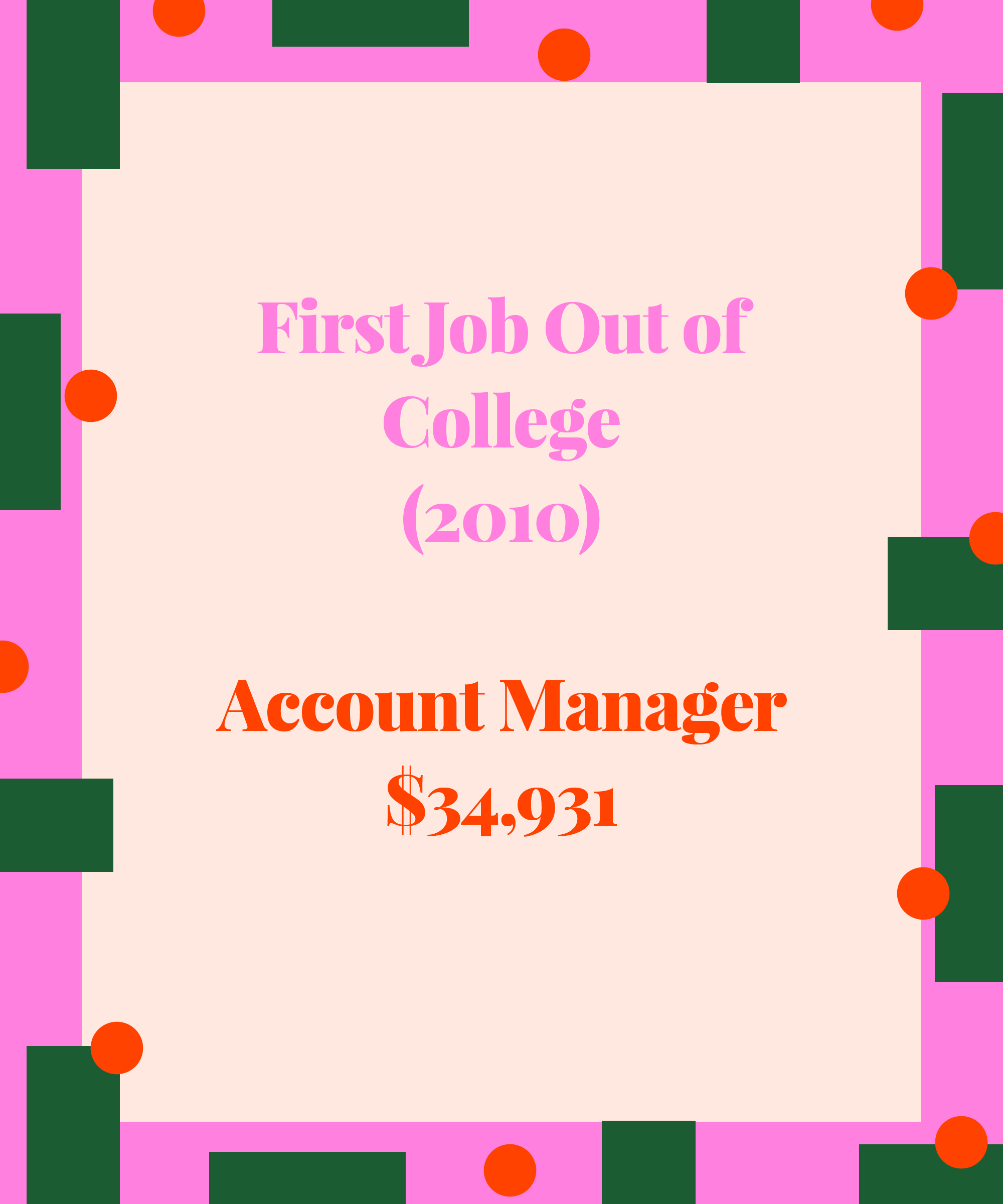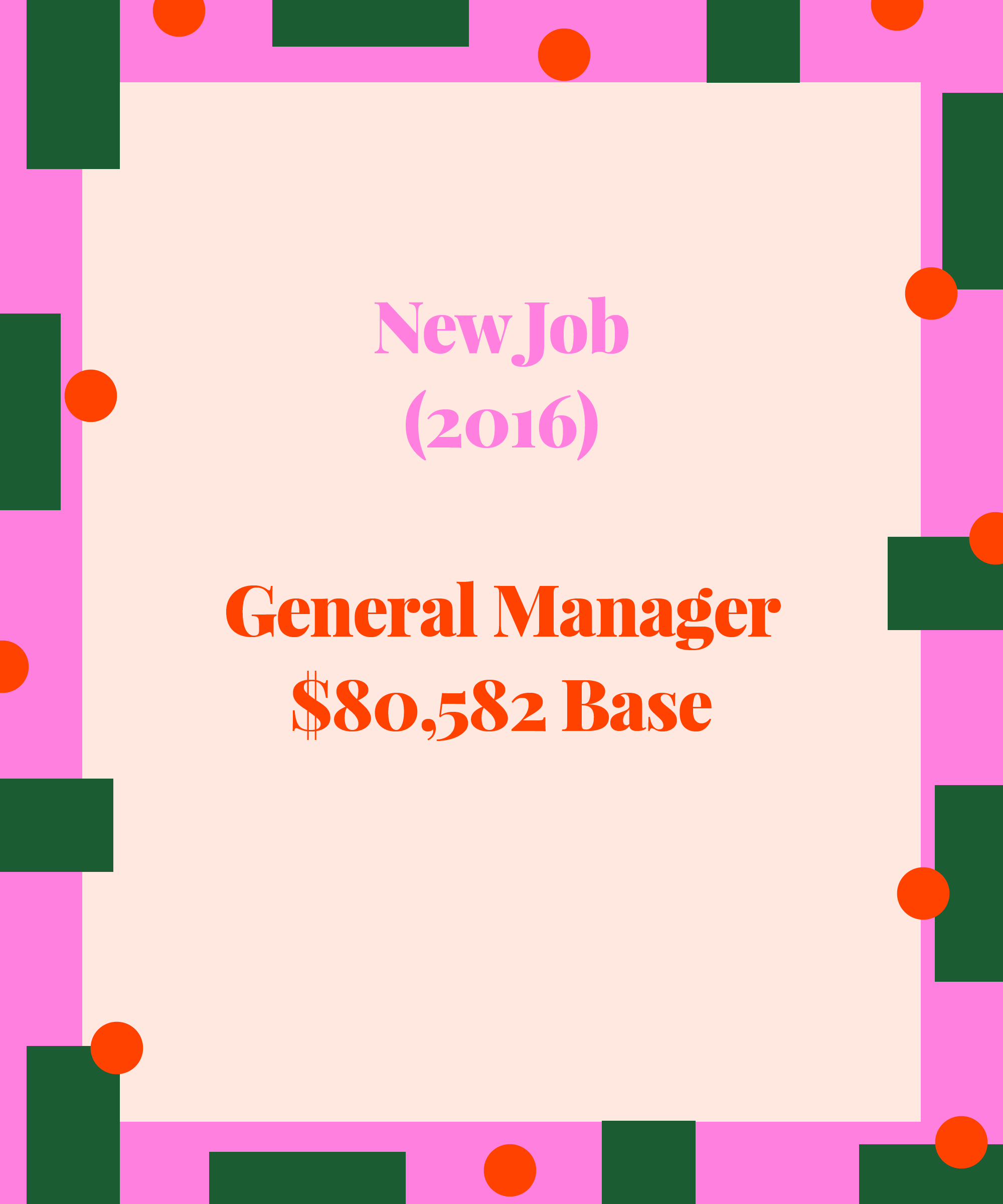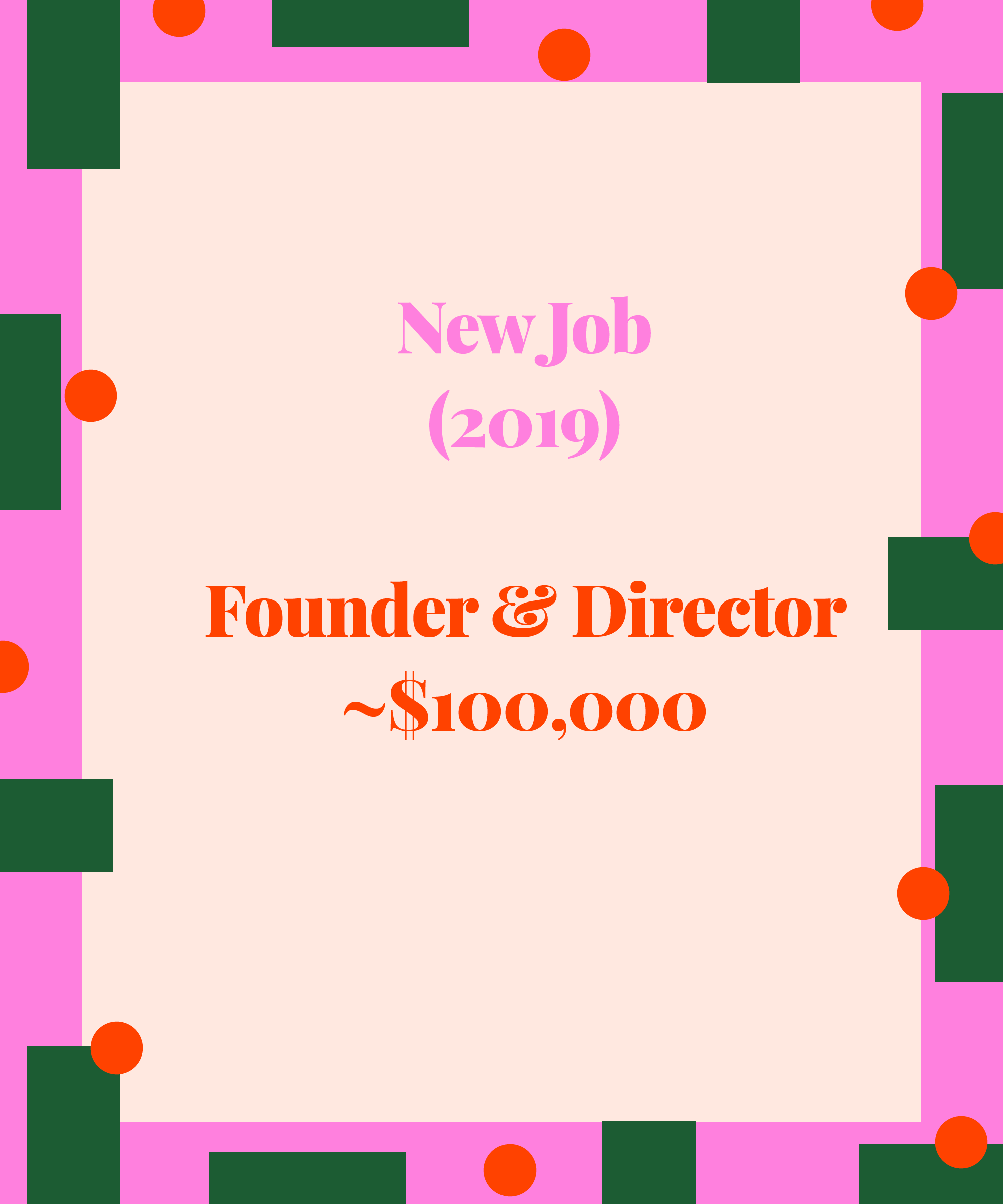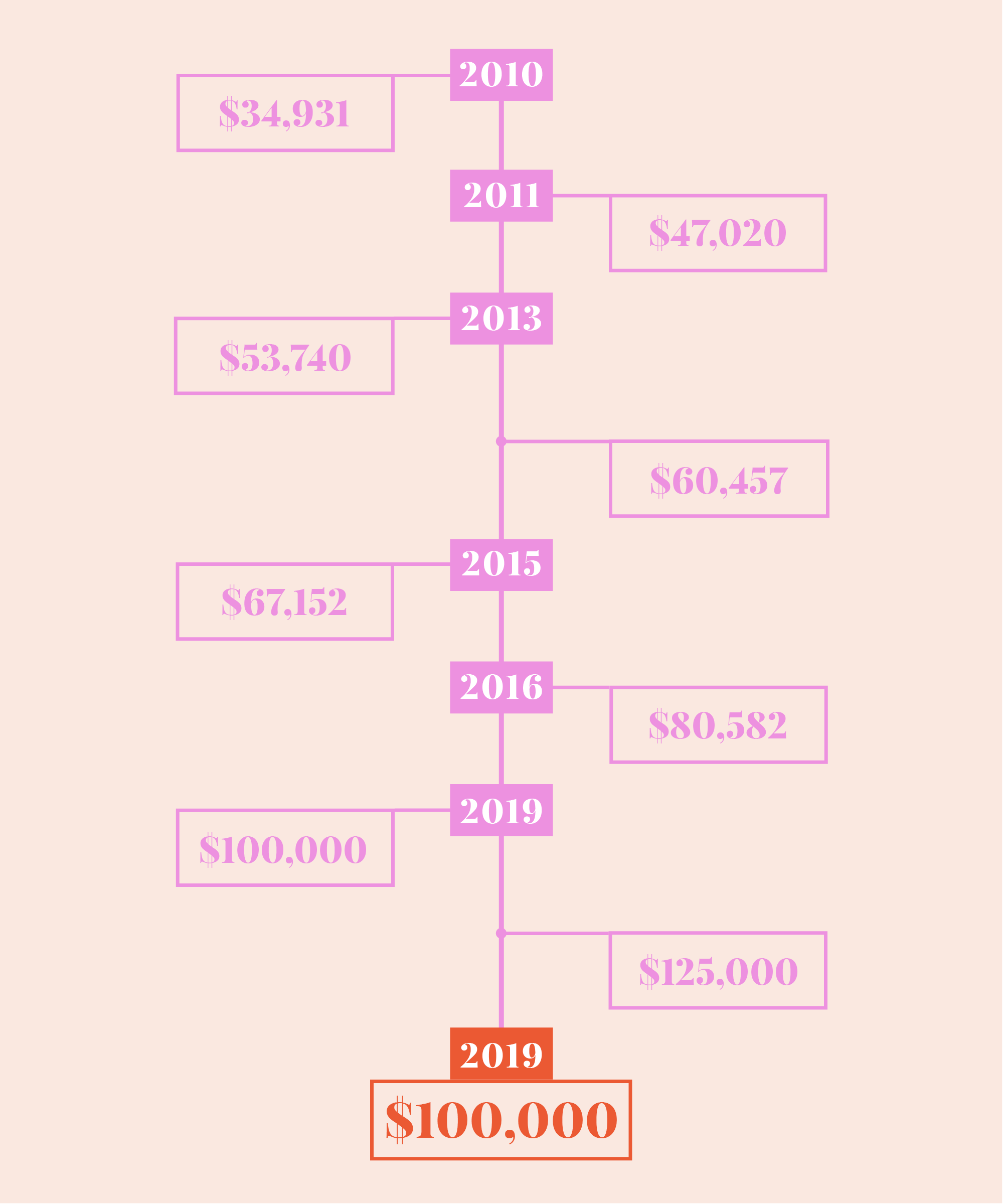In our series Salary Stories, women with long-term career experience open up about the most intimate details of their jobs: compensation. It’s an honest look at how real people navigate the complicated world of negotiating, raises, promotions, and job loss, with the hope it will give young women more insight into how to advocate for themselves — and maybe take a few risks along the way.
Been in the workforce for at least eight years and interested in contributing your salary story? Submit your information here.
Previously, we talked to a legal assistant in Austin, a director of product management in Oakland, and a social worker in Raleigh.
Editor’s Note: All currency has been converted to USD.
Age: 32
Current Location: Dallas, TX
Current Industry & Title: Founder and director of a luxury concierge company
Starting Salary: $34,931
Current Salary: ~$100K
Number Of Years Employed: 10 years
Biggest Salary Jump: $25,000 (from $100,000 to $125,000) in 2019
Biggest Salary Drop: $25,000 (from $125,000 to $100,000) in 2019
Biggest Salary Negotiation Regret: “None. I’ve always been a badass negotiator. Unfortunately, I always had some sort of visa restriction in Australia, which meant I could only do certain kinds of jobs for certain kinds of companies. Negotiation was always about more money for a role that I didn’t particularly like doing to stay in a country I loved. Kind of like making the best of a bad situation. Now my values have shifted slightly. I really value flexibility and vacation time.”
Best Salary-Related Advice: “My biggest piece of salary advice to my younger self would be that it actually looks better to ask for more money than it does to accept the first offer. Particularly for me, who had sales-related roles. I felt negotiating my salary demonstrated my sales acumen. I would always say in an interview, ‘Well, if I can’t even negotiate a higher salary then I don’t deserve the job!’
Asking for more money is only doing what men are anyway. Make sure you don’t come off as desperate. In my last role, they wanted to give me a raise of $15k. In the meeting with the CEO and COO (both men), I flat-out said I was disappointed with the offer and needed to think about it. They were both visibly shocked. Over that weekend I wrote them a letter outlining all the value I had brought to the company in my short tenure. I then gave them two options: either a higher base, or a lower base with a high spending budget for personal development. In the end they went with the higher base.”

The Aussie workplace approach and attitude was so different from the U.K’s. They cared more about whether you were a cultural fit with the company and if you had a can-do attitude, knowing that they could teach you the rest, versus the U.K., where employers are so stuck on how you look on paper.
I had done a lot of promotional and brand ambassador work while at university and had a passion for experiential marketing. I loved seeing how brands could make people feel at live events, so I talked myself into my first role as an Account Manager for an experiential agency.
I made $34,931. At the time there was a minimum salary requirement in order to be sponsored by a company, and this was it. With the AUD to GBP conversion rate, I honestly felt like I was killing it in life. Comparatively, the recession had hit the U.K. hard and my friends were earning much less than half of what I was.”

I have lied about my salary for every single new role. So far, I have never been asked to prove it. I tended to add around $10k to my previous salary and ask for $10k more, making it a jump of around $20k. No job is really worth moving for with a $5k increase, and future employers know that.”

What was even more ironic was that she helped a number of charities supporting women, yet didn’t support her own female employees; one by one all of the women on my team left. My dad always told me to never leave a job without another one to go to. But things were so bad, I would have rather risked having to leave Australia than continue working there.”


A week later, my visa was up for routine renewal and my boss saw this as an opportunity to cut an expensive overhead. There was no obligation on his part to keep me on and re-sponsor me, nor did he have to pay any severance given my visa was expiring. This is another example of leaving yourself vulnerable if you’re paid on the higher end of the scale compared to your overall team.
Thankfully, I was building a good backstory for myself as a specialist in B2B tech marketing, so it was easy to land this next job. Unfortunately, the company was bizarre and I was caught up in my hiring manager filing a lawsuit against the founder and CEO, and there was a bunch of other people politics. I didn’t last very long in this role. I was completely uninspired and my high base salary meant I was so comfortable that I wasn’t driven to make my bonus.”

It was certainly a rollercoaster working here, but overall I’ll look back at my time fondly. It was definitely humbling, and I realized I wasn’t as good with people as I thought I was. I have always been a people person and viewed understanding and connecting with people as my superpower. My clients and colleagues had always loved me. The issue was that as a peer I wasn’t threatening. But as a boss who was the same age as my team, suddenly I was under far more scrutiny and, if I’m honest, the subject of some jealousy and resentment.
I later realized that I was the symptom and not the cause, and the source of the resentment was the CEO fulfilling her needs by bringing me on but not listening to her employees, who needed more resources to help them. This was probably one of my biggest career accomplishments: Winning the respect of my team and turning around a toxic work culture. In fact, I probably learned more about myself and other people in that role than I did anything else.”

It was relatively quick finding a job once I started to look. There are lots of jobs out there, like start-ups in the Bay Area. I perhaps was being quite picky — as I’m 10 years into my career, I’m less willing to settle compared to my younger years. I found that big corporate positions were rejecting my applications. Smaller, scrappier start-ups were interested, but of course they were much lower-paying roles. Had I been willing to stay in the B2B IT space and travel to Silicon Valley, I could have landed a very high-paying role, but I knew I’d be miserable if I did that.
After not working for a few months, I didn’t really feel like I had the luxury to take my time in looking for the ‘perfect’ role. Ultimately I had two great options to choose from. You may not get the perfect role initially, but if you are hardworking and determined, then you can certainly mold the role into something better. ”

My previous job ensured I had all the tools to do this role, but my passion was in sales. Account management never brought me satisfaction. I felt like a human punching bag for the internal team’s frustrations about the clients and the client’s annoyance about timelines, results and so on.
When someone left the company, I spotted an opportunity to take ownership of a new vertical from a sales and growth perspective. Having clients talk to you because they want something from you is completely different to when they feel like you owe them something. I created a plan to present to the senior leadership team of where and how I could see this role yield results for the company, and why I was the best person to do this.
This was not an easy transition, as I had to fulfill my current role and the one I was fighting for about 3 months, before I could move 100% into the new role. It was tough — hard on my mental state and overall wellbeing — but it did prove my dedication. It was so much sweeter when I was able to fully move into the Director role.”

I was devastated. I had finally, after 10 years, found a job I loved. To make the situation worse, my husband and I had already decided to relocate to Texas and were both expecting to do our jobs from there.
Rather than panic, I immediately decided I wouldn’t be a victim. In my exit interview, I asked the CEO if it would be a conflict of interest if I started my own company doing something similar. They gave me their blessing and here I am, three months in, running my own luxury concierge company and loving it. My company provides celebrity meet and greets, VIP access and exclusive custom experiences. This is essentially what I did in my previous director role.
I’m proud of myself for asking outright if this would be possible. Most people are overwhelmed in their exit interview, but I always turn my lemons into lemonade. I’m already earning close to my previous salary and now have the added benefits of flexibility, unlimited vacation time and a much lower cost of living. And I can see myself earning closer to $150K by the end of this year. This is particularly exciting, as it’s given me the freedom I need while I study to become a women’s sexual empowerment coach.”

Like what you see? How about some more R29 goodness, right here?






